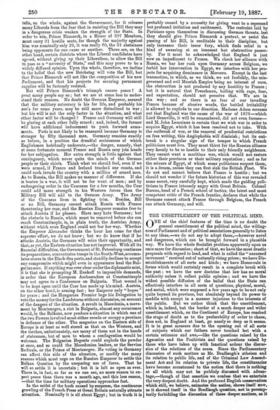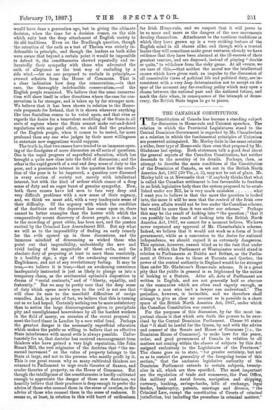THE UNSETTLEMENT OF THE POLITICAL MIND. r\ NE of the
chief features of the time is no doubt the general unsettlement of the political mind, the willing- nessof Parliament and of political associations generally to listen to any ideas,—we do not say to adopt them,—however novel and dangerous, which can be brought forward in a plausible way. We have the whole Socialist problem apparently upon us once more for discussion; short of that, we have the most drastic • proposals with regard to land, and what is called the "unearned increment" received out of naturally rising prices; we have Die- establishments of all sorts and kinds ; we have Horns-rule in forms which would certainly result in a complete break with the past ; we have the new doctrine that law has no moral authority unless it reflect public opinion ; and we have the widest possible diffusion of the belief that the State can effectively interfere in all sorts of questions, physical, moral, and social, which were supposed a few years ago to be not only quite beyond its province, but absolutely beyond its power to meddle with except in a manner injurious to the interests of the public. But we rather think that the unsettlement, which is, indeed, but the border of a much deeper and wider unsettlement which, on the Continent of Europe, has reached the stage of doubt as to the preferability of order to chaos, does not, in England at least, go nearly so deep as it Beams. It is in great measure due to the opening out of all sorts of eubjects which our fathers never touched but with a certain reticence and awe,—like the questions raised by the Agnostics and the Positivists and the questions raised by those who have taken up with fanatical ardour the discus- sion of the relations of the sexes. Since the Parliamentary discussion of such matters as Mr. Bradlaugh's atheism and its relation to public life, and of the Criminal Law Amend- ment Act and its relation to private life, the constituencies have become accustomed to the notion that there is nothing at all which may not be publicly discussed with advan- tage,—though of that assertion we confess that we entertain the very deepest doubt. And the profound English conservatism which still, we believe, animates the nation, shows itself now, as it showed itself in the Bradlaugh question, not in peremp- torily forbidding the discussion of these deeper molten, as it
would have done a generation ago, but in giving the ultimate decision, when the time for a decision comes, on the side which suits best the deep attachment of English society to its old traditions. Even on the Bradlaugh question, though the retention of the oath as a test of Theism was strictly in- defensible in principle, and though the leaders on both sides were aware that beyond a certain point it would be impossible to defend it, the constituencies showed repeatedly and re- iteratedly their sympathy with those who advocated the oath of allegiance as the best way of excluding by a side wind,—for no one proposed to exclude in principle,— avowed atheists from the House of Commons. That is a clear indication how deep the conservatism,—in that case, the thoroughly indefensible conservatism,—of the English people remained. We believe that the sa'me conserva- tism will show itself in other directions where the case for con- servatism is far stronger, and is taken up by far stronger men. We believe that it has been shown in relation to the Home- rule proposals for Ireland, that it is shown wherever anything like true Socialism comes to be voted upon, and that even as regards the desire for a benevolent meddling of the State in all sorts of regions where the State cannot make cut-and-dried regulations with any good effect, we shall find the prudence of the English people, when it comes to be tested, far more profound than any one who judges by their mere willingness to entertain new suggestions would suppose.
The truth is, that two causes have tended to an immense open- ing of the floodgates of mere discussion on all sorts of questions. One is the rapid progress of superficial education, which has brought a quite new class into the field of discussion ; and the other is the rapid growth of a real and deep sense of duty to the poor, and a passionate interest in the question how the condi- tion of the poor is to be improved, a question now discussed in every section of society not merely with intellectual interest, but with the kind of ardour which comes of a deep sense of duty and an eager burst of genuine sympathy. Now, both these causes have led men to face very deep and very difficult problems with a new sense of their urgency, and, we think we must add, with a very inadequate sense of their difficulty. Of the urgency with which the condition of the destitute and the depraved has come upon us, there cannot be better examples than the horror with which the comparatively recent discovery of decent people, as a class, as to the crowding of great cities, has been met, and the passion excited by the Criminal Law Amendment Bill. Bat say what we will as to the impossibility of finding an early remedy for the evils opened up in these discussions, and the immense mischief of denouncing as wicked those who point out that impossibility, undoubtedly the new and kivid feeling of the magnitude of these evils, and the absolute duty of preparing at least to meet them resolutely, is a healthy sign, a sign of the awakening conscience of Englishmen, and not of any revolutionary feeling. It may be true,—we believe it is true,—that an awakening conscience inadequately instructed is just as likely to plunge us into a temporary chaos, as the sentimental optimist's disposition to dream of "social contracts," and of "liberty, equality, and fraternity." But we may be pretty sure that the deep sense of duty which opens men's eyes to the evil is not one that will close its ears to the manifold difficulties of unripe remedies. And, in point of fact, we believe that this is turning out as we had hoped. Certainly nothing can be more satisfactory than to notice the large discouragement given to precipitate pity and unenlightened benevolence by all the hardest workers In the field of mercy, on occasion of the recent proposal to meet the hard times in London by a new relief fund. Perhaps the greatest danger is the necessarily superficial edneation which makes the public so willing to believe that an effective State interference with moral evils is always possible. Unfor- tunately for us, that doctrine has received encouragement from thinkers who have gained a very high reputation, like John Stuart Mill, the real originator of the doctrine that "the un- earned increment' on the value of property belongs to the State at large, and not to the persons who mostly profit by it. This is one great reason why so many cultivated thinkers are returned to Parliament to urge crude theories of finance, and cruder theories of property, on the House of Commons. But though the intelligence of the constituencies is hardly cultivated enough to appreciate the danger of these new doctrines, we heartily believe that their prudence is deep enough to prefer the advice of those who counsel them in the sense of caution, to the Advice of those who counsel them in the sense of rashness. It seems so, at least, in- relation to this wild burst of enthusiasm
for Irish Home-rule, and we suspect that it will prove to be so more and more as the dangers of the new movements develop themselves. Attachment to the cautious traditions in which they have grown up is a very striking feature of the English mind in all classes alike, and though with a trusted leader they will sometimes make great ventures, already we have evidence that they have been alarmed at the ill-success of their greatest venture, and are disposed, instead of playing "double or quits," to withdraw from the risky game. At all events, we are sure of this,—that neither the moral nor the intellectual causes which have given such an impulse to the discussion of all conceivable views of political life and political duty, are in- consistent with a very deep determination not to accept on the spur of the moment any far-reaching policy which may open a chasm between the national past and the national future, and mark the date when, in consequence of the triumph of demo- cracy, the British State began to go to pieces.



































 Previous page
Previous page